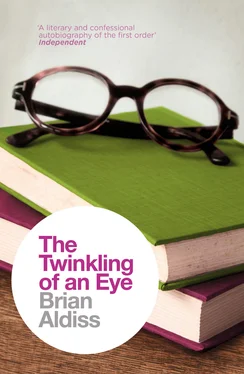Other people are there. They leave. They look back over their shoulders as they go. I have an impression of a bare room, through the window of which the house opposite looks too close. A girl remains in the room, younger than Abigail, blue-eyed, mischievous. Perhaps it is her younger sister. Perhaps I never knew. The younger girl endeavours to make herself pleasant. I remain alert. Abigail tells me to take my shorts down.
I say I do not want to.
She takes me gently by the arm and tells me to do as she says or she will tell my mother.
So I take my trousers down.
The younger girl comes near and stoops close to see what I have to offer. She does not touch. After a moment I am allowed to pull up my trousers.
It is curious to feel simultaneously humiliated and powerful.
To write of East Dereham with nostalgia would be easy. Yet it was no paradise. The shop was my marvellous playground, full of friends and enticements; for years I was to miss it dreadfully. On the other hand, there remained the abattoir, with the blood running in the gutter, where cows, like Jesus himself, were giving their lives that Man should live.
And what of that crude doctrine of punishment by eternal fire then being preached? Had anyone in Dereham ever had a new idea since George Borrow decided to speak Romany? And there remains the case of the Michelin man.
The Michelin man is dropped by van into Dereham market square. He parades about, advertising those excellent tyres. He is encased in the familiar Michelin trade mark. He’s a little fatty made of white tyres, with old-fashioned motoring goggles for eyes. All he can do is strut, or rather waddle, from one end of the town square to the other. A gaggle of boys, of which I am one, follows him about.
The man grows nervous and tells us to clear off. We persist. One of the bigger boys throws a stone. It bounces harmlessly off the pneumatic waistline. At this signal for violence, all the lads begin to shower stones at the unfortunate man.
He tries to run. We follow.
At first it seems like fun. But the man’s terror is palpable, as perhaps hounds pursue a stag because they scent its fear. The man runs into a cobbled side street. Here is a better supply of stones. I never throw one, but wait to see what happens next – the writer’s guilty role in life.
The boys have the man cornered. His fat arms wave helplessly.
They close in like a wolf pack. Bigger boys appear from nowhere, as at any unpleasant scene bigger boys have a habit of doing. They kick the man until he topples over. Boyish laughter, cackles, more kicks.
He lies in a corner, rolling from side to side on the cobblestones, like some unutterable crustacean washed up on a Permian beach.
‘Quick! Someone’s coming!’ A shout from one of the lads.
The boys clear off. I stand there. No one comes.
I make no move to help the Michelin man, indeed am frightened of him. I clear off in my turn.
I never speak of this unsettling incident to Dot, any more than I can tell her how Abigail made me expose myself. She might leave home if I did so.
But no. Dot is in the last stages of pregnancy, wandering heavily about her bedroom, sighing, applying eau-de-Cologne and cachous. A nurse is engaged to tend her for a fortnight or two. It is Nurse Webb again, sober as a judge, starched from stem to stern. And I have a misfortune that is to cost me dear.
I catch whooping cough from someone at school.
Whooping cough was common in the days before there were inoculations against it. It is extremely infectious. If babies catch it, they may suffer brain damage or die.
It is somehow typical of me to be ill at a crucial time, when Dot is about to give birth. It is the last day of April, the next best thing to the Ides of March.
The maids keep me in the back room. Trying to stifle my coughs, I listen as they read Alice in Wonderland to me. I am more or less aware of people in the rest of the flat, tramping about as if this were a boarding house. Nurse Webb, of course. Doctor Duygan, with his black bag. Bill, up from the shop. The baby is delivered in the middle of Chapter Six.
Alice caught the baby with some difficulty, as it was a queer-shaped little creature, and held out its arms and legs in all directions, ‘just like a starfish’, thought Alice.
It is a girl! Praise the Lord! This time , it is a girl! No tears from the mother this time. Our united prayers have been answered with unusual efficiency.
Bill enters the back room, flustered and uttering a series of short, sharp edicts. I must get some shoes on. He is going to take me to Grandma Wilson immediately. I cannot stay in the house in my infectious state.
A little suitcase is already packed.
I am bewildered.
But why—?
I just told you. Come along.
I am allowed as far as the threshold of the maternal bedroom. Dot is in bed. She lifts up in triumph a little wizened howling thing. A cursory glance suggests it is much like Alice’s starfish. Its mouth is open and bright red. Scarcely less red is the rest of it.
Elizabeth Joy, my sister Betty, has emerged successfully into the world and looks none too pleased about it. She sums up what she sees in a shrill bawl.
Only a glimpse is permitted me. It is enough. Peering back into the past, you find some episodes are written in mist, some on stone. Here is stone enough to last as long as life. The overheated room, those windows looking out to blank walls, the nurse in the background with her starched bosom, the rumpled bed, the triumphant, sweating woman in the bed, the scarlet babe, howling as it is held aloft like a banner – only a glimpse is needed. The tableau is going to remain for ever.
I have no words.
Bill gets me downstairs and into the car. I clutch the suitcase. We head for Peterborough.
When will I come back home? I ask Bill. Bill does not know.
The film ends.
John Bowlby, who died in 1990, was a towering figure in child psychiatry and psychoanalysis. His monumental work is in three volumes entitled Attachment, Separation: anxiety and anger and Loss: sadness and depression . They appeared respectively in 1969, 1973 and 1980. I could not read them properly for the overwhelming sense of sorrow they conveyed.
In one of his other books, Child Care and the Growth of Love , Bowlby has this to say:
It is common in Western communities to see in the removal of a child from home the solution to many a family problem, without there being any appreciation of the gravity of the step and, often, without there being any clear plan for the future. It is too often forgotten that in removing a child of five from home direct responsibility is taken for his future health and happiness for a decade to come, and that in removing an infant the crippling of his character is at risk.
From all this the trite conclusion is reached that family life is of pre-eminent importance and that ‘there’s no place like home’.
So, in an extreme state of bewilderment, I was dropped at my grandmother’s house. There Bill left me.
My grandmother’s house was to me what the blacking factory was to Charles Dickens. So greatly did that enforced stay fill me with guilt and dismay, that I dared speak of it to no one until I was well into adulthood.
The Five Year Abyss swallowed me up. I stayed in Peterborough in Grandma Wilson’s house for six months before being allowed to return to Dereham.
Wait. That is untrue. That is what I believed for many years, until I was adult and out of the Army, sufficiently hardened to look back into that exile. There were details I could check. Whereupon I found I was kept away from home not for six months, but a mere six weeks .
I could scarcely credit it. How long did Charles Dickens spend in the blacking factory? We know the humiliation of that episode in Dickens’ childhood went so deep that he was unable to speak of it until he was a middle-aged man.
Читать дальше












